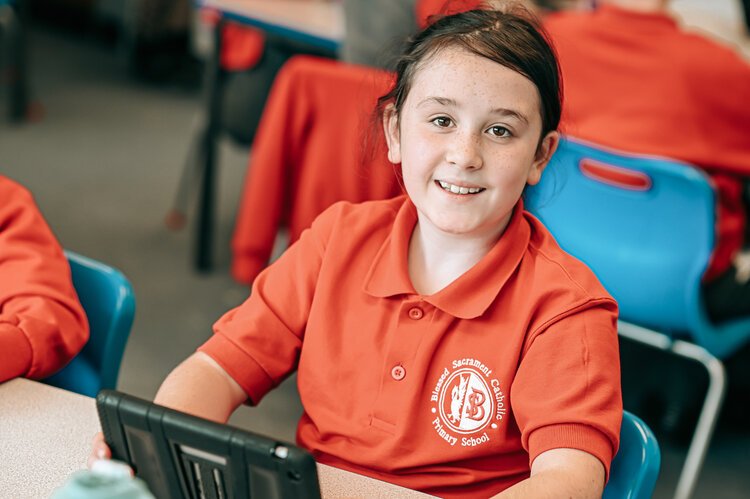
Safeguarding & Staying Safe Online
At Blessed Sacrament Catholic Primary School we recognise that we are living in an increasingly digital world where a wealth of software, tools and technologies are used to communicate, collaborate, express ideas and create digital content. Through the provision of a high-quality computing curriculum we will equip pupils with the computational thinking and creativity that they need to benefit from these technologies safely.
Our curriculum has been split into 3 strands: The Online World, Digital Literacy and Algorithms and Programming.
‘
The school ensures children learn in a safe, caring and enriching environment. Children are taught how to identify risky, unsafe or problematic situations, how and when to seek help, how to develop positive and healthy relationships and how to avoid situations where they might be at risk including by being exploited.
The school also has a statutory responsibility to share any concerns it might have about a child in need of protection with other agencies and in particular police, health and children’s services. Schools are not able to investigate child protection concerns but have a legal duty to refer them. In most instances the school will be able to inform the parents/carers of its need to make a referral. However, sometimes the school can in certain circumstances share information without the consent of the family and may be advised by children’s services or police that the parent/carer cannot be informed whilst they investigate the matter or make enquiries. We understand the anxiety parents/carers understandably feel when they are not told about any concerns from the outset. The school follows legislation that aims to act in the interests of the child.
Safeguarding is:
Protecting children from maltreatment
Preventing impairment of a child’s health or development
Ensuring that children are growing up in circumstances consistent with the provisions of safe and effective care
Create opportunities to enable children to have optimum life chances in adulthood.
(2004 Children’s Act)
The Online World
Children will learn to become responsible, competent, confident and creative users of information and communication technology. This begins with our school learning platform and extends to wider forms of communication, including instant messaging and some of the popular social networks that they may begin to use as they get older. They will learn rules of internet safety and etiquette so that they can get the most out of online communication and collaboration, whilst protecting themselves and their personal and private information. They will know what to do if something goes wrong and understand the increasing responsibilities they have in keeping themselves safe and protected online as they approach secondary school and beyond.
Digital Literacy
Children build on the digital literacy skills used for communication in The Online World. They will learn to use technology purposefully to create, organise, store, manipulate and retrieve digital content. This includes undertaking online research, critically evaluating the information they find online and communicating their knowledge and ideas digitally using a range of software and technologies. These skills are essential in the modern world, where information, services, communication and even jobs are often dependent on digital literacy.
Algorithms and Programming
Algorithms and Programming
Children will be taught the principles of computation, how digital systems work, and how to put this knowledge to use through programming. They will create and refine algorithms to control external devices and on-screen robots with increasing complexity. Through learning to code, children will use skills such as critical thinking, problem-solving, creativity and resilience, and will be equipped to use information technology in a range of contexts. These skills are invaluable for their future work prospects and as active participants in a digital world.
Special Educational Needs
We recognise that some children with SEND may be more vulnerable to online bullying and manipulation. It is important that all children can access and understand the e-safety messages that run throughout computing. Some children may require additional practice to implement e-safety rules. E-safety rules should be permanently displayed around school with pictorial cues as well as words to support recall and understanding. Instructions for tasks are given in small steps, with adults modelling the steps on the whiteboard to support memory and understanding. Children with SEND may have additional adult support in the classroom or partner up with a buddy to complete tasks together.
Key Safeguarding Documents
Online Safety
https://www.childline.org.uk/info-advice/bullying-abuse-safety/online-mobile-safety/sexting/
https://www.gov.uk/government/publications/use-of-reasonable-force-in-schools/
https://www.nspcc.org.uk/preventing-abuse/keeping-children-safe/share-aware/
https://www.ceop.police.uk/safety-centre/
https://www.internetmatters.org/?gclid=EAIaIQobChMIktuA5LWK2wIVRYXVCh2afg2aEAAYASAAEgIJ5vD_BwE
https://www.childnet.com/parents-and-carers/parent-and-carer-toolkit
https://www.lgfl.net/online-safety/default.aspx
https://www.saferinternet.org.uk/advice-centre/parents-and-carers
Useful Links
To find out more about how to help someone close to you, visit:
https://ehd.liverpool.gov.uk/kb5/liverpool/fsd/service.page?id=vpt5pUMEYZw
https://www.counterterrorism.police.uk/actearlypartners/
Get help if you’re worried about someone being radicalised - GOV.UK (www.gov.uk)
Operation Encompass
In conjunction with Merseyside Police, our school is involved in an initiative called Operation Encompass. The purpose of Operation Encompass is to safeguard and support children and young people who have been involved in, heard or witnessed a domestic abuse incident. Following such an incident, children will often arrive at school distressed, upset, worried and unprepared.
Operation Encompass aims to ensure that appropriate school staff (called Key Adults) are made aware early enough to support children and young people in a way that means they feel safe and included.
At our school, the Key Adults are Mr Byrne (DSL) and Mr Davey (Deputy DSL).
This is a valuable initiative that means we can continue to support and help children and families within our school community when they need it most. If you have any questions about Operation Encompass please do not hesitate to contact our Key Adults.
You can find our more by visiting www.operationencompass.org or by contacting our Key Adults.



